After several months of planning, on the 4th of December 2017, an eight-strong delegation of the Reformed Church in Hungary (RCH) left for Lebanon and Syria to express our solidarity and show our support to our borthers and sisters in the Middle East.
The aim of the visit was two-fold: On the one hand, we wished to express our solidarity and to show our support to the members of the reformed community, all the more so since, according to church leaders in Syria, the war had made people somewhat distrustful and there has been a strong decrease in the number of Christian community members due to migration and high mortality rates. On the other hand, we hoped to be able to show members of reformed congregations in Hungary that no matter how far and foreign Syria might seem, willing enough, there was always a way to join forces and help troubled communities and congregations fulfil their mission.
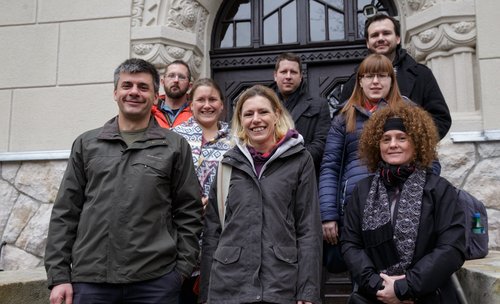
The delegation members were the RCH ecumenical officer and vice-president of WCRC Europe Rev Balázs ÓDOR, Head of the RCH Mission Department Rev Eszter DANI, CEO of the Hungarian Reformed Church Aid Mr Márton JUHÁSZ, Head of the RCH Refugee Integration Unit and vice-moderator of Churches' Commission for Migrants in Europe (CCME) Ms Dóra KANIZSAI-NAGY, CEO and Co-founder of Kalunba Services Ltd, implementing partner of RCH Mr Balázs ACSAI, HEKS-related Refugee Integration coordinator of RCH Ms Ágnes SZÉKELY, Editor-in-chief of the national church website of RCH (reformatus.hu) Mr György FEKE as well as RCH ecumenical secretary and member of WCRC Executive Committee Ms Diána ERDÉLYI.
Union of Armenian Evangelical Churches
Our first journey took us to the headquarters of the Union of Armenian Evangelical Churches in the Near East (UAECNE). We were kindly received by Rev. Megerdich Karageozian, the president of the church, who did not only provide us with coffee and cookies but also with valuable background information on the history of Armenians.
The Union of Armenian Evangelical Churches in the Near East (UAECNE) is an autonomous body of churches comprising 25 congregations throughout Syria, Lebanon, Turkey, Greece, Egypt, Iran, Iraq, Australia. The Armenian Evangelical Church was established on July 1, 1846, by thirty-seven men and three women in Constantinople. The result of the 19th century awakening in Constantinople was the formation of a society called the "Pietistical Union". The members held meetings for the study of the Bible. These reformists faced strong retaliation from the Armenian Patriarchate of Constantinople. Eventually, after Patriarch Matteos Chouhajian excommunicated the reformists, they were forced to organize themselves into a separate religious community, the Protestant Millet. This separation led to the formation of the Armenian Evangelical Church in 1846. Today, there are approximately 100 Armenian Evangelical churches all over the world.
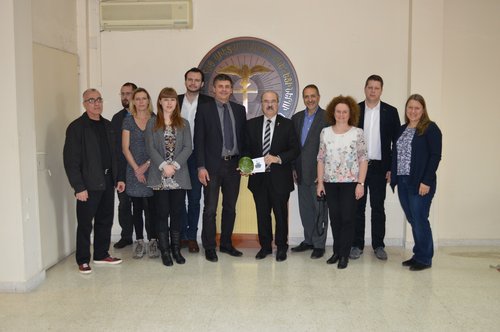
At the UAECNE headquarter
During the 1915 genocide, Armenians were forced to leave historic Armenia (Turkey) and fled to south of Aleppo, many moving on as far as Lebanon, Europe, the United States or even Australia. A great number of Armenians have been forced leave Armenia more recently, due to extremely high rates of unemployment. The president of UAECNE described the situation as "social and economic deportation", stressing that family experiences of fleeing and migration made Armenians sympathetic towards all refugees.
Lebanon itself, has a long history of looking after refugees and a fairly generous attitude with regards to sharing whatever resources they have. More than a decade of Lebanese civil war however, made people rather cautious and the last thing they want is for the religious balance in the country to be upset – especially that political affiliations of people are strongly intertwined with their religious faith. While being sympathetic enough, Lebanese still do everything in their power to encourage refugees to return to their homelands with time – that is probably one of the main reasons why Palestinians and Syrians cannot gain citizenship and thus cannot really start a new life in Lebanon. There is also a certain amount of fear that once Palestinians were given citizenship in Lebanon – the same way they could obtain citizenship in Syria – no-one would remain to stand up for Palestine. Lebanese of course, are quite aware that Palestinian refugees are rather helpless and hopeless. They are also aware that the majority of Syrian refugees have no way of knowing what would wait for them if they went back to Syria. Still, refugees are a huge financial burden on Lebanon, and those who do try to provide for themselves are often employed as cheap work force, which leads to further tensions. While the Lebanese are caught up in a highly controversial situation both morally, financially and emotionally, they do seem to understand: "Lives are lost in Syria but they clean up and go on. Just like we did in Lebanon for years and years and years."
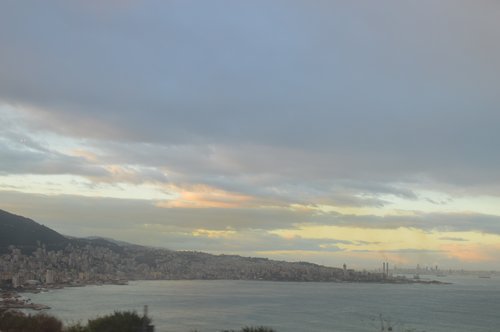
Rev. Megerdich Karageozian, emphasising that theirs was only a very small church, which could not do very much in itself, explained how donations they received were distributed: "If we get money designated as it should go to Syria, 100% of it goes to Syria. If money is given to help Syrians, one-third is used in Lebanon and two-third goes to Syria. If it is given to help Syrians in Lebanon, it is spent in Lebanon." Most of the donations, especially clothes, fuel and medical supplies are sent to Syria. Since the beginning of the crisis, more than 2 million USD reached Syria via the Beirut office of UAECNE.
Schools, After-schools, Education Centre
It was already five years ago that the war in Syria started. There are 400 thousand school-age refugee children registered, 90% of whom do not start school until the age of ten. Under these circumstances, the importance of educational endeavours cannot be over-stressed.
At the Social Action Committee Centre of the Armenian Evangelical Church, we had a chance to meet some of the teachers and children taking part in the after-school programme. Refugee children arriving from Syria have a hard time in Lebanese schools and we got the impression that they could hardly survive at school without the help of the after-school programme. In spite of all the geographical and cultural similarities between Syria and Lebanon, the education systems of the two countries have almost nothing in common. Whereas in Syria the language of education is Arabic and there is not a great emphasis on learning any other languages, in Lebanon, children learn both English and French from a very early age and most subjects are taught in English, or occasionally in French, at school. In the after-school we visited, there were four languages – with three different alphabets – taught and used on a regular basis: Arabic, Armenian, English and French.
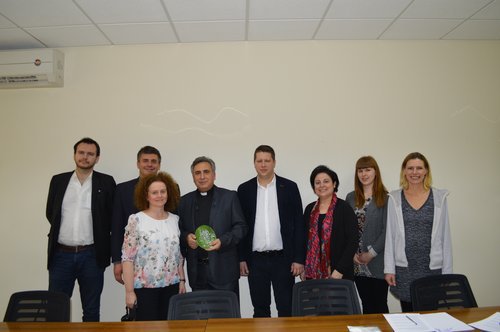
Together with the NESSL leadership
Visiting the The National Evangelical Synod of Syria and Lebanon (NESSL) and two evangelical schools, we learnt about schools and the school system in more detail.
The National Evangelical Synod of Syria and Lebanon (NESSL) is a Reformed denomination in the Middle East. It is a federation of Arabic-speaking congregations that trace back their origin to the evangelical revival in the 19th century. These churches adopted Reformed theology and Presbyterian church government. This Reformed revival was supported by many Reformed churches in the United States. The Ottoman authorities recognised the Protestant faith in 1848, the first congregations were founded in Beirut, Hasbaya. Later congregations were established in the major cities. The Synod was organised in 1920 with several Presbyteries.
Since the very beginning, the evangelical presence in the Middle- East has been accompanied by the emphasis on sponsoring education. The Synod has contributed richly to the educational development of both Syria and Lebanon, with its schools serving more than 14000 students, from grade 1 to 12 today. They operate seven schools in Lebanon and four in Syria. Of great significance is the fact that these schools serve students from all Christian and non-Christian affiliations, with no discrimination toward race, religion or gender. This commitment to inclusiveness addresses what has historically been a source of division, and, interestingly enough, it also seems to be a road leading to quasi-emancipation of Muslim women, as Muslim families often send their daughters to Christian schools. Evangelical schools, four of which are already internationally accredited, strive towards academic excellence, offer extra-curricular activities, provide social and emotional education and aim to prepare students for university in every possible way.
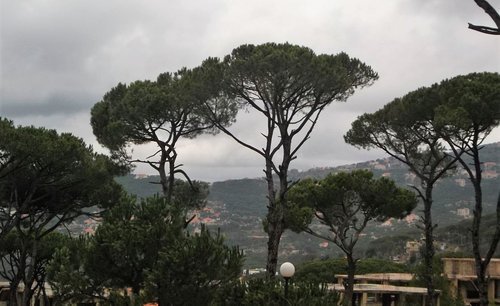
70% of all schools in Lebanon operate as private institutions, and the evangelical schools are no exception. Tuition fees change from school to school and, of course, there are differences concerning the income level of parents as well, but in general, with a very rough calculation, parents need to devote about one month's salary to cover for the tuition costs of a child for the school year. Government operated schools are considered to be of rather low quality and it is not rare for parents to be willing to sell lands in their ownership, in order to be able to cover tuition fees.
In recent years, five new evangelical schools were opened in Lebanon, especially for Syrian refugee children, with the primary aim of preventing as many children as possible from spending their days roaming around aimlessly in the streets and providing not only tangible but also spiritual support, which is extremely important during times of war. Summer camps and teacher training courses are also organised.
In the way of challenges, – apart from the sadly, quite obvious questions of safety – the topic that came up most, was how war destroyed moral and religious values: "At times of war, you are forced to look after yourself and take whatever you can. You are not in a position to give. Often, you are forced to lie. War destroys values which are extremely hard to rebuild. In Lebanon, the war stopped in 1990 and we still have not recovered completely. (...) At times of crisis, people either escape from God or escape to God but either way, they are just escaping."
In light of the above, the role and importance of Sunday Schools seemed self-evident enough. When setting up Sunday Schools, the first step was to find the best possible teachers, who were willing and able to volunteer for the project. It was only after that, that the real challenge started: Children in need had to be found, which proved to be an especially difficult task in the countryside, and then, children had to be helped. It was very reassuring for us to see that all those involved in the Sunday School project were very much aware of the importance of providing psychological support not only for the children but for the volunteer teachers too.
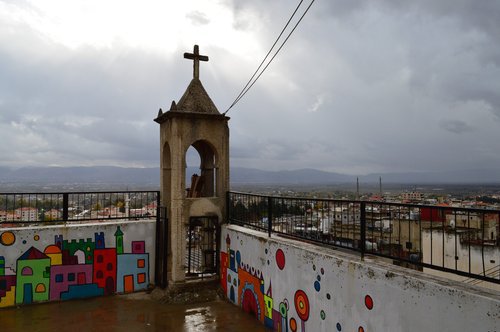
On our second day in Beirut, we also visited the Evangelical Education Centre, set up in an old and once empty school building above the Bekaa valley. Even though the Education Centre does not fulfil the requirements of an official school, it is a place where children learn to read and write, learn some English, some maths, they sing together, they play together, there are regular medical check-ups, there is food to be shared, and there is heating when the surrounding mountains are covered in snow – none of which can firmly be said about the Bekaa valley refugee camp where they come from. Most of the children attending the education centre are Muslim, and while parents at first received the invitation to a place equipped with a cross with certain amount of suspicion, one of the teachers, originally from Aleppo herself, soon gained their trust. By now, parents regularly attend school events and the education centre has become a place for indirectly educating the parents as well.
Fellowship of Middle East Evangelical Churches and Middle East Council of Churches
We met Ms Rosangela Jarjour, the general secretary of the Fellowship of Middle East Evangelical Churches (FMEEC), in Beirut. We learnt about current challenges facing Evangelical Churches in the region and expressed RCH’s gratitude for all the help and guidance our church has been receiving since November 2016, when the ecumenical officer of RCH, Rev. Balázs Ódor, participated at the General Assembly of FMEEC in Beirut. Since then, cooperation between our respective organisations has been strengthened, as a result of which four Syrian young adults had the chance to participate at the "Starpoint" Reformed Youth Festival organised by the RCH in July 2017, in Debrecen. FMEEC is also the organization that coordinates RCH’s contribution to the HEKS support to Syria, from the Middle Eastern side.
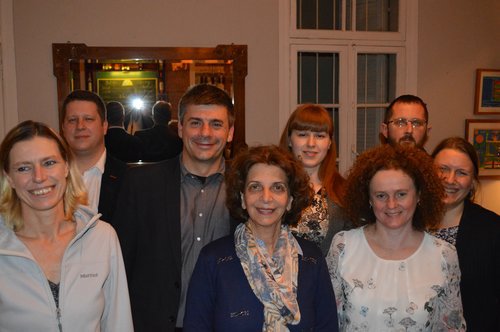
The RCH Delegation with Rosangela Jarjour, General Secretary of FMEEC
The Evangelical members of the Middle East Council of Churches, namely the Reformed, Lutheran and Anglican, decided that they needed to preserve a forum wherein they can, as one family of churches, continue to experience inter-evangelical fellowship and pursue their intra-evangelical search for unity. In 1974, the first General Assembly of the Fellowship of Middle East Evangelical Churches (FMEEC) was held. The churches represented in FMEEC come from Egypt, Syria, Lebanon, Palestine, Jordan, Iran, Kuwait, Sudan, Algeria and Tunisia, and more recently, from Iraq.
Sylvia Haddad, whom we met in a café in Beirut, is a member of the Joint Christian Committee (JCC), which is part of the Middle East Council of Churches' Department of Services for Palestinian Refugees. Sylvia Haddad emphasised the importance of education. JCC runs a school programme for Syrian refugees in Arabic, in line with the Syrian education system, in the course of which students study in Lebanon but go to take their exams to Damascus, Syria.
Homs, Syria
Having spent two hours at the boarder and successfully passed seven check-points on the road, we finally arrived to Homs, Syria. Homs is the third largest city of Syria, after Aleppo and Damascus, and the central link between the interior cities and the Mediterranean coast. Homs was also dubbed "the capital of revolution" and its siege, lasting several years, left its mark on the city.
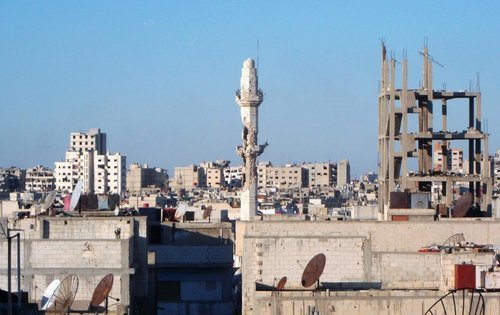
Rev. Mofid Karajili, the pastor of the Presbyterian Church in Homs, showed us around in their newly-renovated care home for the elderly and told us about the time when the care home and the school building next to it served as the demarcation line between fighting forces in the spring of 2012. In spite of all the shooting and the bullet marks still visible on the building, food supplies arriving to the care home were always let in by all the forces.
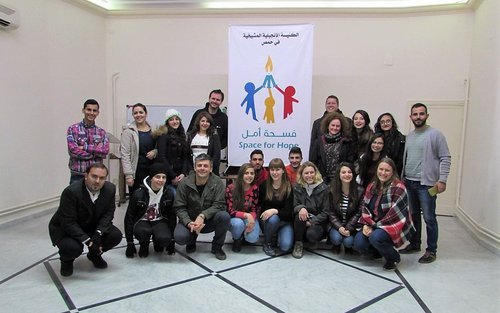
With the Youth Group of the Presbyterian Church of Homs
Soon after the siege ended, Rev. Karajili's congregation started an inspiring new project, named "Space for Hope". The Evangelical School of Homs gives home to the project, in the course of which children and young people, girls and boys, between the ages of 9 and 17, from the different religions of Syria come together to learn and play. Games are organised in a way that all the competing groups have both boys and girls and Christians and Muslims among its members, who have to work together in order to be able to win a game. As Rev. Karajili explained:
Every day consists of two sessions: the games session where we use team games to build or make up relations, and the teaching session that includes time to reflect about what we have learned from these games. We have learned that it is very possible, even lovely, to be with the others that are males or females, Christians, Muslims or Alawites, in the same team to face the same challenge, to work hard to get the same target on the very same ground. This was the target of the event, to put in the minds and the memories of these youths that they can live together, regardless of their religious background and conflicts. We are also committed to make the parents of the youths feel comfortable and safe.
Having visited a few nicely-renewed churches, we finally arrived at the Presbyterian Church, where we had an opportunity to meet young members of the congregation. We soon had a lively conversation going. We asked them about their schools, families, homes, hopes and wishes – commonplace, run-of-the-mill questions at some places of the world but meaningful, at least for us, on our very first day in Syria. Their answers, accompanied by plenty of smiling, were matter-of-fact and without complaints.
Latakia
Latakia is the principal port of Syria and also a see-side party town. While it has escaped comparatively lightly from the physical destruction of the war, members of the biggest congregation of NESSL made it very clear that there was no way it could have been spared by the socio-economic effects.
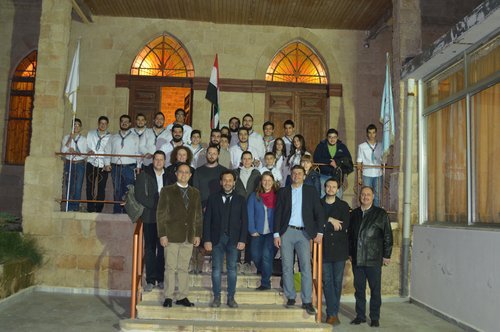
With Scouts from the Latakia Congregation of NESSL
Talking to university students, all of them devoted and active members of their congregation, the topic of conversation kept turning back to the question of military service or leaving the country Out of seven members of the Women's Ministry present, only one had children – daughters – still living in Syria.
Sunday School in Latakia
Aleppo
As we were approaching Aleppo, the number of guns and check-points per square meter seemed to be exponentially growing. We certainly would not have been able to get half as far as that without the essential help of Rev. Haroutune Selimian, president of the Armenian Evangelical Church in Syria and pastor of the Armenian Evangelical Bethel Church, who was our host, our guide and the main organiser of our visit. Now, we finally reached his beloved home town.
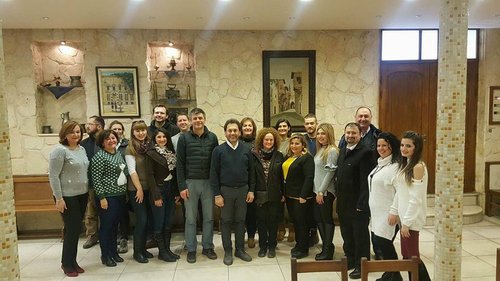
Enjoying the hospitality of the Armenian Evangelical Bethel Church
The Armenian Evangelical School of Aleppo, a favourite with many Muslim families too, was once again ready to receive students. Even though both the buildings and the school buses bore the imprint of previous years, there were classes held even on Saturdays, in an effort to make up for time lost during the war.
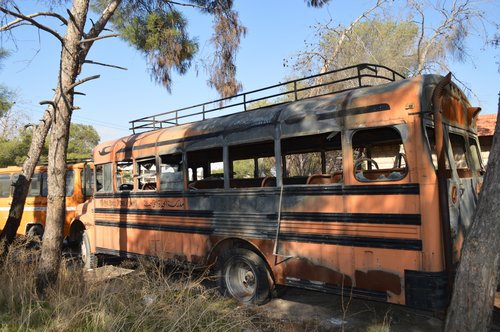
The HEKS project named “Scholarships for Church Schools in Syria” strengthen the inclusive capacity of twelve partner churches and focuses on the inclusion of Christian and Muslim students, on the provision of high quality education and on the building of good relationships between people of different religious groups. The General Convent of the Hungarian Reformed Church decided also to support this project and a fundraising campaign will be launched for 2018, within its educational institutions, in order to help to cover tuition costs for school-kids.
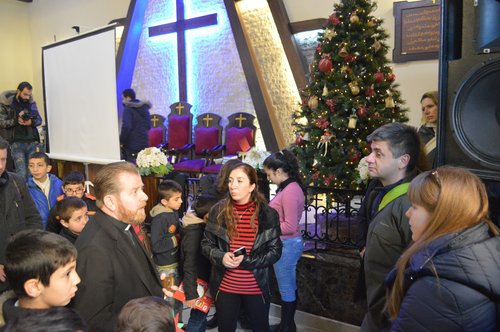
Visiting the Sunday School Program in the Presbyterian Church of Aleppo
The roof of the Armenian Evangelical Immanuel Church was by and large missing but it did not prevent members of the congregation of coming together for a brief "questions and answers" session with us. The most upsetting question came from a sixteen-year-old boy, who explained that he would finish school soon, that he loved his country and that he did not want to fight. His question was blunt and simple: "What do you think I should do?"
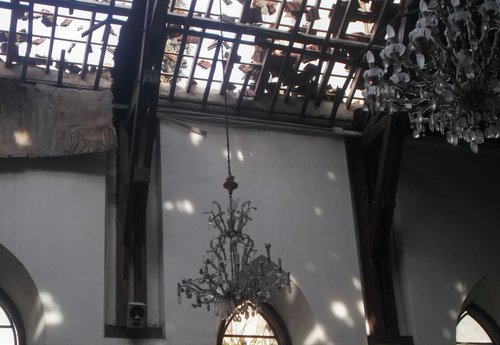
Armenian Evangelical Immanuel Church in Aleppo
Our delegation visited two Sunday schools, in the congregation of NESSL and the Armenian Evangelical Church, since channelling through the collaboration between HEKS/EPER and FMEEC, the Hungarian Reformed Church Aid (HRCA) has launched an online communications campaign at the end of October, focusing on the reformed communities in the Middle East, specifically, FMEEC, NESSL, and UAECNE and Sunday Schools run by them. The aim of the campaign is to invite congregations of the Hungarian Reformed Church (HRC) to dedicate an offering to these communities in the Middle East. During the weekend spent in Aleppo, the RCH delegation had the chance to meet Sunday School children in the Presbyterian and the Armenian Evangelical Churches in Aleppo.
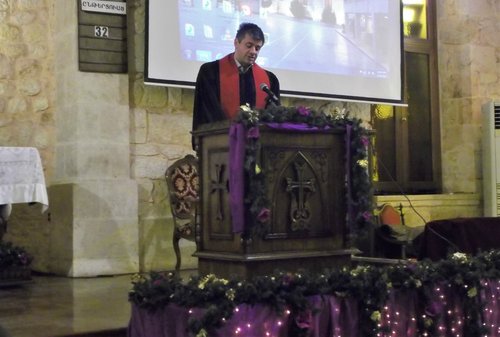
On the occasion of the Sunday service, where a sermon was delivered by Rev. Balázs Ódor, three hundred Sunday School children squeezed into the Armenian Evangelical Bethel Church to sing and celebrate together. One third of the children, those under the age of six, were already born during the war. Rev. Balázs Ódor took the opportunity to explain the main reasons for our visit:
"I encourage, even urge you to let this community, and our community together, in the power of this hope in Christ and God’s coming kingdom be an Exercise area of reconciliation, of joint ambassadorship where we embrace each other, where we let ourselves go so that there is place in our life for others.
We made this effort, having hope in God’s overwhelming grace and peace, we came here so that there is a piece in our life which is you. We are imitating God who does the same with humankind, not counting people’s sins against them, revealing his eternal love in the life, suffer and cross of his Son and confirming it through his resurrection as the eternal principle of his justice."
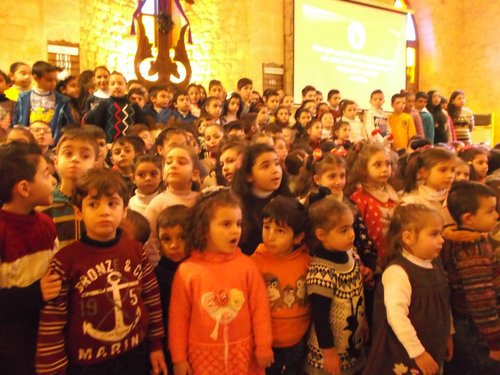
Sunday School Children in the Armenian Evangelical Churches in Aleppo
Written by Ágnes Székely
Photos by Dóra Kanizsai-Nagy, Eszer Dani, György Feke